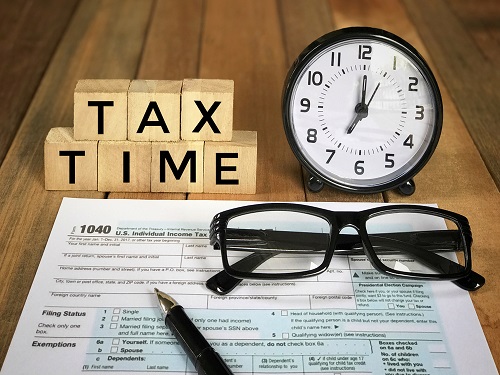10 Income Tax Jargon You Should Definitely Know
24-June-2021 |
Well, yes! Many individuals outsource their income tax* calculation due to its complexity and applicability. However, if your source of income is defined, you will have a specific method of calculation. Moreover, it is subject to revision when a change or update in the tax law is announced. And, the Government of India has announced several tax* benefits for people investing in financial products, such as the life insurance policy, to encourage people to secure their financial future and manage resources wisely. Therefore, if you have a basic knowledge of the Income Tax jargon, you can try filing your income tax return and make the best use of the tax* benefits.
List of Ten Income Tax Jargon that can be Helpful:
The assessee - Assessess is a person or an entity paying tax based on the laws defined in The Income Tax Act, 1961.
A normal assessee is a person paying tax for the income earned during a financial year.
A representative assessee is liable to pay tax for the income earned or loss incurred due to a third party.
Deemed assessee is a person who is liable to pay tax as per the assigned by legal authorities.
The assessee in default is a person who has failed to pay the taxes as part of the statutory obligations.
Previous year and Assessment Year - Previous year or the Financial year is when the income is earned. The income earned a particular year is assessed in the next year, referred to as the income tax assessment year.
Gross total income - Gross total income means the sum of income earned from different sources. According to the Income Tax Act, 1961, there are five heads of income.
Income from your salary
Income from any house property
Profits and gains of business and profession
Income from capital gains, and
Income from other sources
Taxable Income - Taxable income refers to the actual income on which tax is calculated for the financial year. It is calculated by aggregating the income earned from the different heads of income and subtracting the permissible deductions stated in the Income Tax Act, 1961, from Section 80C to Section 80U. For instance, if you have life insurance policies, pension plans, health insurance schemes, etc., you can avail of tax deduction under Section 80C. The premium amount paid qualifies for tax deduction up to ₹1.5 Lakh per year.
At this juncture, it is important to mention the concept of tax exemption as well. Tax exemption refers to the type of income that can be excluded from the purpose of tax calculation. For example, the returns or the payouts from a life insurance policy qualify for tax exemption under section 10(10D). Therefore, calculating taxable income is crucial because you will pay more tax when the taxable income is more than the actual amount. And, on the other hand, if you have paid less tax based on your taxable income calculation, you will be forced to pay penalties later.
At Tata AIA life insurance, we provide varied, comprehensive life insurance policies with customised solutions to offer life cover, savings, and investment options along with tax* benefits apart from the traditional life insurance plans. You can navigate the different policies, compare the features and purchase the right option while purchasing online life insurance.
Income Tax Slab - Income tax is calculated on the taxable income based on a percentage. It varies based on the range of income and is referred to as the income tax slab.
Income Tax Return(ITR) - Income Tax Return refers to the form duly filled and submitted to the Income Tax Department declaring the income earned during the financial year and the amount of income tax payable. There are different forms, such as the ITR1, ITR2, ITR3, ITR4, etc., based on the sources of income, the assessee, and the amount earned.
Tax Deduction At Source(TDS) - According to Income tax rules, a deductor who has to pay an amount to a deductee will deduct the tax and remit it to the government's account directly before making the payment. It is also applicable on various types of payments such as commission payment, professional fees, interest on bank deposits, etc. The tax received by the government are registered through TDS returns filed by the deductor against the Pan of the deductee and acknowledged in Form 26AS or in the TDS certificate to claim the credit. The same has to be furnished while claiming tax credit during filing ITR.
Form 16 - Form 16 is a certificate issued by an employer that contains information on income tax paid on the salary. It contains information about the employer and employee, such as the name, permanent account number, addresses, etc., and other details such as the salary paid, deductions, exemptions, etc.
Advance Tax - Advance tax refers to part of the total income tax which needs to be paid at regular intervals as an advance instead of making a lump sum payment. It is applicable if your tax liability is more than INR 10,000 for a financial year.
Self Assessment Tax - Self-assessment tax refers to the balance amount of tax to be paid by an individual on his income after the advance tax and TDS have already been paid.
Conclusion
The Income Tax Act, 1961 offers different benefits for the taxpayers. It is based on the heads of income, range of income earned, type of investments, etc. Therefore, understanding important tax jargon is an ultimate necessity. Here, in this blog, we have discussed some important tax jargon to enhance your basic knowledge. So, if you have captured the terms well, you can always file your ITR and make the best use of the tax* benefits optimally!
L&C/Advt/2022/Mar/0597







 FOR EXISTING POLICY
FOR EXISTING POLICY 
 FOR NEW POLICY
FOR NEW POLICY 




